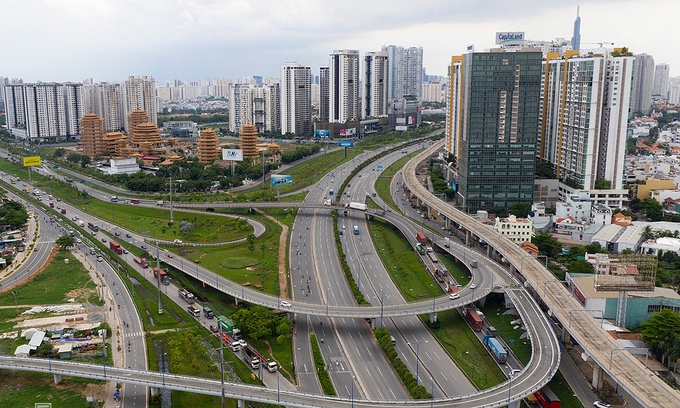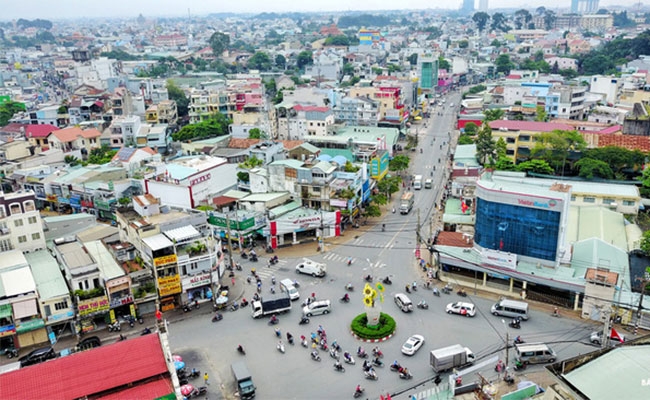 |
| Parts of routes linking what will become Thu Duc City with other provinces in the southeast. (Photo: VNE) |
As reported by VNE, the Thu Duc City will be formed, starting January 1, by merging three eastern districts – 2, 9 and Thu Duc.
The resolution giving birth to the new city was approved by the Standing Committee of the National Assembly, the legislative arm of Vietnam at a meeting Wednesday.
Minister of Home Affairs Le Vinh Tan said the three districts have an important position in the Southern Key Economic Zone (SKEZ), which comprises Ho Chi Minh City, the industrial hubs of Dong Nai and Binh Duong, the cash crop province of Binh Phuoc, the maritime transportation hub of Ba Ria-Vung Tau, Tay Ninh Province, and two Mekong Delta provinces of Tien Giang and Long An.
Major routes linking Ho Chi Minh City, and other southeastern localities run through or in the vicinity of the three districts.
Last year, the three districts contributed one-third of the Ho Chi Minh City’s gross regional domestic product (GRDP), higher than the provinces of Binh Duong and Dong Nai.
According to the government’s resolution, the strong development of the three districts in terms of banking, finance, industry, commerce, services and tourism, along with rapid urbanization and increasing population density, “has prompted the demand for the reorganization, through their merger into one administrative unit.”
With the establishment of Thu Duc City, Ho Chi Minh City can contribute even more to the nation’s economic growth and boost the development of the SKEZ, boosting the southern metropolis’ regional and global profile, it said.
Phan Thanh Binh, chairman of the NA Committee for Culture, Education, Youth, Adolescents and Children, said Thu Duc City “should be given more power and should not be treated as a district-level unit.” The chairman of Thu Duc City should have powers equivalent to that of Ho Chi Minh City’s vice chairman, he added.
“We’re going to build it into a locomotive for development, not just a city managed by HCMC,” he said.
Ho Chi Minh City chairman Nguyen Thanh Phong said that once it is established, Thu Duc will help streamline the apparatus for the city, with around 644 officials leaving the service.
As planned, the new city will spread 211 square kilometers and house more than a million people. It is expected to contribute 30 percent of the city’s economic growth and 7 percent for the nation’s per year.
Once the Thu Duc City is establsihed, Ho Chi Minh City will have a sub-city and 21 districts.
The plan to combine Districts 2, 9 and Thu Duc into one administrative unit and make it an “innovative urban area” has been on the anvil since 2017.
City authorities had said back then that it would create a bright future for both local residents and businesses. It would encompass the hi-tech park in District 9, the university precinct in Thu Duc District and the new urban area and financial center on the Thu Thiem Peninsula in District 2, propelling the city’s plan to turn itself into a smart city, another master plan it had also nurtured since 2017.
(Video: VNE)
The potential “Silicon Valley” of Vietnam
Countries around the world are quickly increasing their investments in high-tech and science parks, both of which are considered the precursors of ‘creative cities.’
The new creative city in Thu Duc is an example of this transformation, stemming from the 700-hectare hi-tech park in District 9 which is regarded as a pillar of growth for both Ho Chi Minh City and the country’s southern region as a whole.
The expansion is intended to turn the region into Vietnam’s own ‘Silicon Valley.’
The District 9 hi-tech park has so far successfully attracted prestigious projects from a coterie of multinational corporations such as Intel from the U.S., Nidec and Nipro from Japan, Samsung from South Korea, Datalogic from Italy, and Sanofi and Schneider Electric from France, actively contributing to the city’s science and technology development.
Such success has led to labels such as the ‘economic driving force’ of the city, the region, and even the whole nation.
District 9 is home to the hi-tech park while District 2 houses the Thu Thiem New Urban Area and Thu Duc District plays host to the Vietnam National University – Ho Chi Minh City, which consists of 12 universities and more than 1,500 PhD holders and 70,000 students.
 |
| Thu Duc district viewed from above (Photo: Bat Dong San) |
|
The interconnectivity of the three areas will serve as a creative ecosystem similar to other models found around the world, where connected communities, businesses, science-education-finance institutions, and government agencies inspire innovative businesses and startups in a ‘win-win’ strategy to increase profits for businesses, institutions, financial companies, and growth for the state and improvement in the quality of life for the residential community, according to Tien Phong News. This particular development model also focuses on keeping the city smart and green, with quality public spaces full of nature in order to create a more creative, healthier community. These amenities are of great appeal to investors and top talent. |



